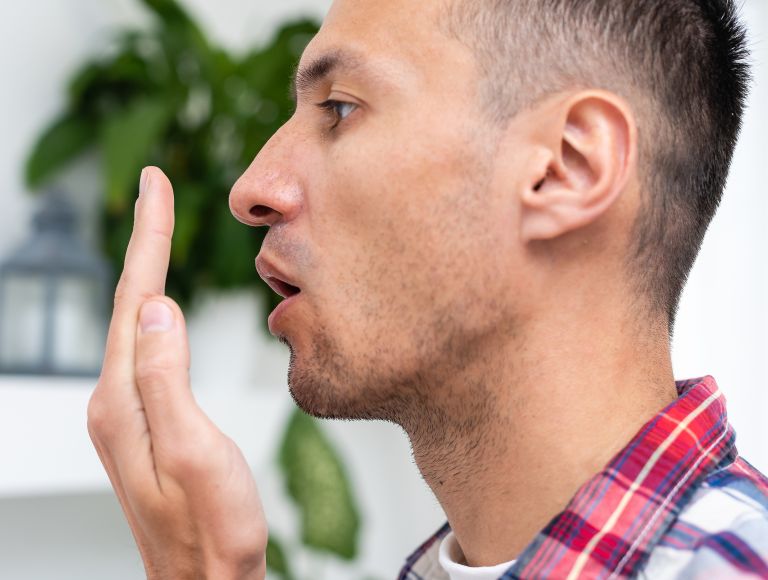Dealing with chronic bad breath, also known as halitosis, can be frustrating and embarrassing. While everyone experiences bad breath from time to time, persistent halitosis may indicate an underlying dental or health issue. At Smile Well Dentistry in Duncanville, TX, Dr. Nirmala Marneni and our team offer comprehensive halitosis treatment to identify the root cause of your bad breath and provide effective, long-lasting relief. Whether your bad breath is due to poor oral hygiene, gum disease, or other factors, we’re here to help you enjoy fresh breath and renewed confidence.
What Causes Chronice Bad Breath?
Halitosis can be caused by a variety of factors, some of which are easily treatable, while others may require more extensive care. Identifying the cause of your bad breath is the first step in finding a solution that works for you. Common causes of halitosis include:
Poor Oral Hygiene:
One of the most common causes of bad breath is inadequate oral hygiene. When food particles are left in the mouth, they break down and produce sulfur compounds that can lead to an unpleasant odor. Plaque buildup on your teeth, gums, and tongue can also contribute to persistent bad breath.
Gum Disease (Periodontal Disease):
Gum disease is a major cause of chronic bad breath. Bacteria that accumulate in the pockets between the teeth and gums release foul-smelling toxins, which can result in halitosis. According to the American Dental Association (ADA), treating gum disease can significantly reduce or eliminate bad breath.
Dry Mouth (Xerostomia):
Saliva plays a key role in maintaining a healthy mouth by washing away food particles and neutralizing acids. When your mouth is dry, bacteria can accumulate, leading to bad breath. Dry mouth can be caused by medications, medical conditions, or dehydration.
Tobacco Use:
Smoking or chewing tobacco not only causes bad breath but also increases the risk of gum disease, which can further exacerbate the issue. The chemicals in tobacco products dry out your mouth and leave a lingering odor.
Diet:
Certain foods, such as garlic, onions, and spicy dishes, can temporarily cause bad breath. However, if food particles remain trapped in your teeth or gum line, they can continue to produce unpleasant odors.
Medical Conditions:
In some cases, halitosis may be a symptom of a medical condition, such as acid reflux, sinus infections, respiratory infections, or diabetes. If Dr. Marneni suspects that your bad breath is related to a health issue outside of oral health, she may refer you to a specialist for further evaluation.
Treatment Options for Halitosis at Smile Well Dentistry
At Smile Well Dentistry, we take a personalized approach to halitosis treatment by first identifying the underlying cause of your bad breath. Once we determine the cause, we can recommend the most effective treatment plan to provide you with lasting relief. Here are some of the treatment options we offer for halitosis:
Professional Dental Cleaning:
If your halitosis is due to poor oral hygiene, a professional dental cleaning can help. Our hygienists will thoroughly clean your teeth and gums, removing plaque and tartar buildup that may be contributing to bad breath. Regular cleanings, along with proper brushing and flossing habits, are essential for maintaining fresh breath.
Gum Disease Treatment:
If gum disease is the source of your bad breath, Dr. Marneni may recommend periodontal therapy, such as scaling and root planing (deep cleaning), to remove bacteria and infection from below the gumline. Addressing gum disease not only improves your breath but also supports your overall oral health.
Treating Dry Mouth:
For patients suffering from dry mouth, we can recommend solutions to stimulate saliva production and keep your mouth hydrated. This may include drinking more water, using over-the-counter mouth moisturizers, or changing certain medications that may be causing dry mouth.
Tobacco Cessation Support:
If you use tobacco products, quitting is one of the most effective ways to reduce bad breath. We can provide resources and guidance to help you stop smoking or chewing tobacco, improving both your breath and your overall oral health.
Dietary Adjustments:
If your diet is contributing to halitosis, we may suggest avoiding certain foods or improving your oral hygiene routine after eating to prevent lingering odors.
Oral Hygiene Counseling:
Improving your oral hygiene habits is key to maintaining fresh breath. Dr. Marneni will work with you to ensure you are brushing and flossing correctly, including cleaning your tongue, which can harbor bacteria responsible for bad breath. We may also recommend the use of mouthwash or tongue scrapers to further reduce bacteria buildup.

Preventing Halitosis
Preventing bad breath is often as simple as maintaining a strong oral hygiene routine and addressing any underlying health issues. Here are some steps you can take to prevent halitosis:
- Brush your teeth twice a day and floss daily to remove food particles and plaque.
- Use a tongue scraper or brush your tongue to remove bacteria.
- Stay hydrated to prevent dry mouth.
- Schedule regular dental cleanings and checkups to maintain your oral health.
- Avoid tobacco products, as they can contribute to bad breath and oral health issues.
- Limit foods and drinks known to cause bad breath, such as garlic, onions, coffee, and alcohol.
- Chew sugar-free gum or suck on sugar-free lozenges to stimulate saliva production.
Get Professional Bad Breath Relief in Duncanville, TX
If you’re struggling with persistent bad breath, Smile Well Dentistry can help. Dr. Nirmala Marneni and our team are dedicated to providing effective halitosis treatment to help you enjoy fresh breath and optimal oral health. Contact us today to schedule your consultation and find relief from halitosis.